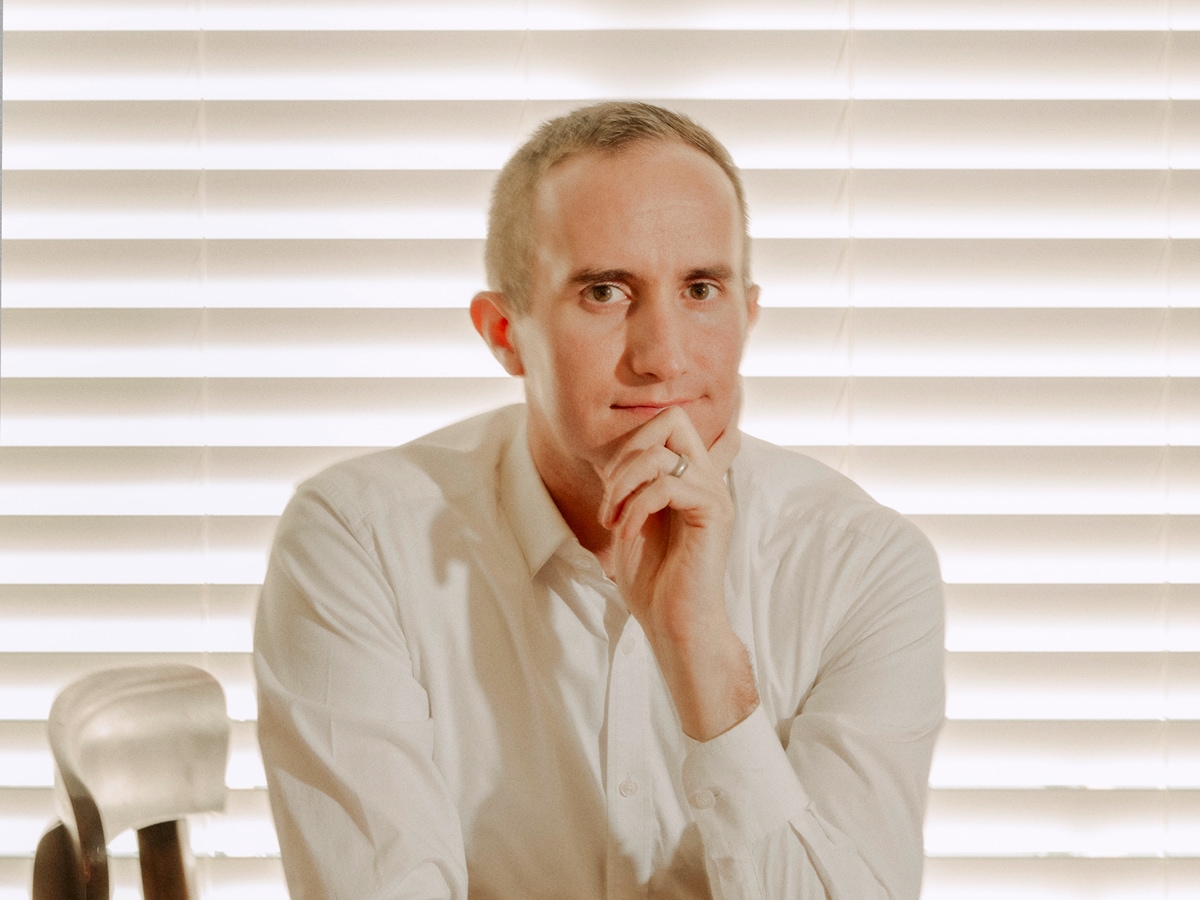There are two things in life that everyone has to be interested in, whether they like them or not, and that is health and money. It doesn't matter if you don't find those topics exciting, those topics are interested in you.” Regardless of your wealth, status or job, Morgan Housel, author of The Psychology of Money: Timeless Lessons on Wealth, Greed, and Happiness thinks it is important to take an active interest in investing.
Although Housel didn’t set out to democratise finance, there is certainly elements of it in his book. This is not a self-help manual, however, nor is it a technical guide filled with easy strategies. The book delves into something more fundamental in investing, while exploring some of the commonly held misconceptions.
“Investing is not the study of finance. It's a study of how people behave with money. It's a really broad, all-encompassing field of how people make decisions around risk and greed and fear and scarcity and opportunity,” Housel tells Opto.
"Investing is not the study of finance."
He is a student of history and of society. His particular lesson, in the case of The Psychology of Money…, applies to the mindsets and behaviours that govern investment choices — of the world’s greatest inventors to a humble gas station attendant.
“There's a lot that you can learn about investing from biology and sociology, and politics and military history and all these other fields,” Housel says. “The more that something is common throughout fields, the truer it is. So if you can find patterns that apply to many fields about human behaviour then you've probably discovered something that is fundamental about human behaviour and is going to keep showing up in the future.”
Housel’s ideas have also resonated in Hollywood. Los Angeles-based media company Cavalry Media recently optioned the rights for The Psychology of Money… from Harriman House publishers and not long before Housel spoke with Opto, he had been contacted by Cavalry Media’s co-founder Dana Brunetti —producer of House of Cards, 50 Shades of Grey, and TheSocial Network to name a few.
“He'd read the book and thought that there was definitely a way to adapt it into film. I'm familiar with his background, so it didn't take that much to get me on board,” Housel says.
He was characteristically calm and collected about the news, which will put him in the same league as the likes of Michael Lewis — the author of The Big Short: Inside the Doomsday Machine, which was made into a Hollywood film in 2015 — just one in a long list of writers Housel admires for their ability to bring to life the stories of business and finance.
“I think every writer would love to see their work come to life on film and I'm really interested to see what happens,” Housel says.
A black diamond run
Housel did not start out with a burning desire to invest, but began in his twenties. His education wasn’t conventional either. “I grew up ski racing in Lake Tahoe, near California, and did an independent study programme that let me bypass what you would consider traditional high school as I was skiing six days a week,” Housel recalls.
The study programme, which Housel admits required of him to do very little actual studying, meant that when he eventually made it to college, he was starting on the bottom rung. That did not stop him developing a fascination for finance and investing. “This was the early- and mid-2000s when Wall Street had a lot of cachet — much more than it does today,” he says.
"This was the early- and mid-2000s when Wall Street had a lot of cachet"
Upon completing college Housel began his career in investment banking. “I realised in the first 10 minutes of walking in the door that this was not for me. The culture, the kind of cutthroat hazing aspect of it just really turned me off,” he says. Housel switched to private equity, and he loved it. “And then, of course, the global economy just fell to pieces after that.”
His success is maybe not surprising considering the enthusiasm with which Housel talks about writing. But it was not until the financial crash halted Housel’s ambitions that he considered putting pen to paper. After losing his job at Triton Pacific in 2008, a friend of Housel’s suggested he apply for a writing role at financial publication The Motley Fool.
In the more than decade since, Housel has honed his writing skills there, at The Wall Street Journal, and now at the Collaborative Fund, the consumer retail-focussed venture capital and private equity group where he has been a partner for four years. For him, writing is something that everyone could benefit from. It is a proving ground. It forces one to explain an idea, and it can bring clarity.
“I just love the process of taking vague ideas, gut feelings, things I’m not really certain about and then once you put them on paper, it really becomes a lot clearer in terms of crystallising your thoughts,” Housel explains. “I don't think it's a coincidence that some of the best investors of all time are also great writers — Warren Buffett, Peter Lynch, Howard Marks, Benjamin Graham — I could keep going down the list.”
There are instances, he notes, in which these individuals are writing not for an audience, but purely to organise their own ideas. He gives the example of Marks, who has spoken previously about how he writes his memos to clarify his own thinking. “I've always looked up to those people just because they hit the Venn diagram for me of great investors and great writers,” Housel explains.
On a subconscious level at least, this is what happened during the writing of The Psychology of Money…. “It's not that I set out and said, ‘let's make something that's complicated more understandable’. [But] when I was writing at The Wall Street Journal the task — my mission so to speak — was to write a column that a hedge fund manager would gain an insight from, but that a complete novice with no financial background would [also] understand,” Housel explains.
"when I was writing at The Wall Street Journal the task ... was to write a column that a hedge fund manager would gain an insight from, but that a complete novice with no financial background would [also] understand"
“Being able to explain something complicated in a simplistic way is, to me, the hallmark of good writing. That's how all writing should be. What writer wants to confuse the reader?”.
Gaining perspective
The answer to what makes a great investor, like what makes a great writer, is one that many people have tried to deduce. It is certainly a question that people claim to know the answer to. For Housel, however, most of these claims often amount to a fallacy. After all, they often don’t take into account a crucial determiner — perspective.
“No one should pretend that they have an accurate view of how the world works, nobody does,” Housel states. “All of us, at best, have experienced a tiny fraction of what the world is capable of doing to you. I think that's why the future is always so surprising to us. Throughout history, all of [it] is just a continuous chain of people being surprised.”
“You're constantly going to be experiencing new things that you never thought possible, not because you're going through an unprecedented period, just because you're constantly gaining a little bit of new perspective on the world that you didn't think existed until you saw it.”
There are, however, central tenets that Housel thinks underpin successful investing: endurance and survival. “If the goal for me is to remain invested for decades, then what is of most importance is endurance and survival, to make sure that I'm never forced out of the game for either financial or psychological reasons — that I can remain standing and endure whatever is thrown at me. That's the cornerstone of how I invest.”
You only have to look at Buffett’s fortunes to see this effect. If he had got out of investing at 60 years of age, his fortune would only have amounted to 0.1% of his current $84.5bn net worth. Furthermore, if Jim Simons had started investing at age 10 years old — as Buffett did — and had carried on investing for 70 years — as Buffett did — the his net worth, Housel calculates, would stand at $63,900,781,780,748,160,000.
Investors need endurance to withstand the constant grind of recessions, bear markets, pandemics and any other unknowns. “That is what fills all the history books, and it's going to be what our future is about. If I can just withstand those and stick around, then I'm going to do just fine over time,” Housel says.
"If I can just withstand those and stick around, then I'm going to do just fine over time"
In conjunction great investors, Housel considers, give themselves room for error. They create a buffer for if things go wrong, such as extreme volatility. In his book, Housel highlights Bill Gates’ conservative strategy in Microsoft’s early days of keeping enough money for a year’s worth of payroll for if there were no sales. Housel also quotes Buffet, who said that he would “not trade even a night’s sleep for the chance of extra profits”.
Simplicity is also important. The fewer levers Housel has to pull, the better. “The more complicated I make my investing approach, the more likely I am to give up on it when it's out of favour, or to make a mistake that is really emotional, because something happened in the economy or the market and I go in and change a bunch of stuff in my portfolio.” By taking out the need to make as many decisions, Housel can increase his chance of enduring, and let compounding do its thing.
Looking ahead at investment
There is, of course, a requirement to understand what makes a good investment. That is not lost on Housel, nor on The Collaborative Fund.
As such, its investing thesis assumes that companies which use their abilities to do some good in the world will have an economic competitive advantage. The established idea of impact investing saw a do-gooder investor pitted against a market that was often not forgiving of such lofty ambitions and forced them to sacrifice. But, The Collaborative Fund targets a perceived shift in investor sentiment.
Housel points to a change in information flows in the past decade that has allowed consumers to see company operations in more detail — how goods are manufactured or how employees are treated, for example. And, more than ever consumers look to spend money only on companies whose values align with their own.
This creates opportunity. Companies perceived as having a positive impact by enough people will, in theory, attract more customers and enthusiastic employees, as well as drawing attention from investors that will consider appropriate time horizons. As such, The Collaborative Fund sees exponential opportunity in companies that are both good for investors and for the world, through a system that Housel calls the Villain Test (see Stock Heroes boxout).
For Housel, Uber [UBER] and Lyft [LYFT] show this clearly with an almost perfect case study of each fund’s thesis. “[Their] products are as identical as they come among almost any competitive industry… the apps look nearly identical, and the pricing is very similar. But Lyft has gained a lot of market share over Uber over the last five years."
"[Uber and Lyft's] products are as identical as they come among almost any competitive industry"
The turning point came around 2016, when negative reports about Uber’s company culture came out. “A lot of consumers said, ‘I really don't want to associate with that’,” Housel recalls. Instead, investors took an increasing interest in Lyft, the assumption being that the corporate culture and philosophy of which presented a much more appealing option to many.
Investing in the mind
As people gain access to more investing tools, it is important to understand the fundamental underpinning of investing and consider new ways of thinking about finance — in part the genesis of The Psychology of Money. Housel is, in many ways, attempting to unveil some inherent truths in human behaviour as a way to better understand how people can not only invest, but what it is to be human.
This begs the question, with advances in machine learning enabling intelligent machines to shoulder more of the burden of personal finance, will people be required to invest in the future?
“I’d say the most important aspect of investing, regardless of strategy or style, is the human aspect,” Housel states.
“I’d say the most important aspect of investing, regardless of strategy or style, is the human aspect"
While he considers the analytical aspect to be important, he does not feel it’s too difficult to understand. It is, after all, objective. “The behavioural side is what's always going to move the needle and separate the people who do very well over time from those who struggle,” he thinks. “It's not just one piece of the puzzle, it's the most important, integral part of the puzzle.”
Furthermore, while technological advances may have changed the financial landscape, we can, according to Housel, never solve for human behaviour.
“We can't just fix who we are as humans. There’s always going to be greed, fear, misbehaviour, and people who take too much risk or not enough — that's always going to be the case. It is going to be as important an aspect of investing 100 years from now as it was 100 years ago.”
“We want to invest in companies that are doing good, but only whose products a purely self-interested villain would also want to buy,” Housel says. This is the basis of the Collaborative Fund’s Villain Test. “If the company is making any sacrifice to consumer tastes, or to flavour or user experience, we don't want anything to do with it.”
Housel considers Toyota [TM] Prius. While it may be doing wonders for emissions, Housel admits it is not the most attractive vehicle, nor is it likely to win many races. Then, Housel says, there is Tesla [TSLA]. The company is also cutting down emissions and is, in his, a fast, beautiful sports car. “I think Tesla passes the Villain Test as even if you do not care about global warming, if you do not care about climate change, you still might buy a Tesla.”
"I think Tesla passes the Villain Test as even if you do not care about global warming, if you do not care about climate change, you still might buy a Tesla"
In essence, the villain in the test would be interested in a Tesla, not because of the good it can do, but because it is an exceptional product. Any environmental benefit it provides is effectively a by-product.
Housel also highlights the likes of Beyond Meat [BYND]. In buying its products, an individual individual, one can reasonably assume, is reducing their meat consumption, but this is not necessarily their intention. They may just enjoy the product.
This way of thinking comes from a place of practicality. “Appealing to people's sins is always going to have a place in the world. We're human. It's always been and always will be the case. We're never going to get rid of tobacco companies, or liquor companies, or gambling companies and I don't have anything against those per se,” Housel adds. “But I think companies that do good in the world are going to have more market share over the next generation than the previous generations. I think it's very high likelihood.”
This article was originally published in our Opto Magazine. You can purchase copies on our Opto Shop.
Disclaimer Past performance is not a reliable indicator of future results.
CMC Markets is an execution-only service provider. The material (whether or not it states any opinions) is for general information purposes only, and does not take into account your personal circumstances or objectives. Nothing in this material is (or should be considered to be) financial, investment or other advice on which reliance should be placed. No opinion given in the material constitutes a recommendation by CMC Markets or the author that any particular investment, security, transaction or investment strategy is suitable for any specific person.
The material has not been prepared in accordance with legal requirements designed to promote the independence of investment research. Although we are not specifically prevented from dealing before providing this material, we do not seek to take advantage of the material prior to its dissemination.
CMC Markets does not endorse or offer opinion on the trading strategies used by the author. Their trading strategies do not guarantee any return and CMC Markets shall not be held responsible for any loss that you may incur, either directly or indirectly, arising from any investment based on any information contained herein.
*Tax treatment depends on individual circumstances and can change or may differ in a jurisdiction other than the UK.
Continue reading for FREE
- Includes free newsletter updates, unsubscribe anytime. Privacy policy





